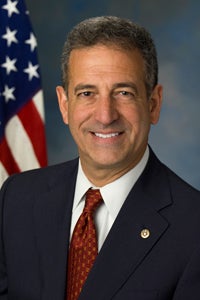On April 19, Harvard Law School’s American Constitution Society sponsored “A Progressive Vision of National Security,” a lecture delivered by Former Wisconsin Senator Russ Feingold ’79.
The only member of the Senate to vote against the PATRIOT Act in 2001 and one of 23 to vote against the Iraq war in 2002, Feingold recently authored “While America Sleeps.” The book details his criticisms of American foreign policy since 9/11 and proposes a plan to correct the nation’s course.
He discussed why he chose to write the book – which is his first – about national security, rather than issues with which he is better associated, such as campaign finance reform. He said that, despite an initial spike in engagement in the years immediately following 9/11, the American government and people are not sufficiently connected with the rest of the world, and have failed to stay connected to the issues raised then. He said that, although it is understandable that public discourse and government resources shifted to address the financial crisis, a crucial lesson from 9/11 is that when we’re not alert to what’s occurring in the rest of the world, regardless of what’s occurring domestically, we can be taken completely by surprise.
“We need to learn to walk and chew gum at the same time. We can’t say ‘domestic issues now, global issues later.’ We need to address both at once,” Feingold said.
He explained that America suffers from a myopia of looking at only one country at a time. For example, pundits and politicians debate the threats posed by Afghanistan and Pakistan, but ignore equally salient risks in countries such as Somalia, Mali and Nigeria.
“We have to figure out a way to get around thinking of terrorism at the exclusion of other international problems. We shouldn’t make foreign policy by asking which one country we should focus on right now,” Feingold said. “We as a people and a nation have to think about the world in several directions at the same time and understand the connections between different countries.”
Feingold said that what has passed as foreign policy discussion during the presidential primaries is particularly disheartening. Popular talking points are to allege that President Obama apologizes too much for America, to mock the President’s foreign trips, and to repeat ad nauseum the mantra of American exceptionalism.
“I happen to think that America is exceptional and is the greatest country in the world, but does it really help our foreign policy to go around saying that? It’s not a good way to reach out to the rest of the world at a time when we need to improve the reputation of this country,” he said.
Feingold hopes to encourage Americans to become “private diplomats.” There must be opportunities for people of all ages to spend a period of time overseas to not only improve America’s image abroad, but also to ensure that there are Americans who can become individual experts about other countries and help us all become better connected with other parts of the world.
